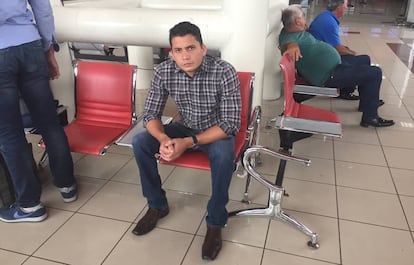Cuban dissident accuses Havana of “psychological war of attrition”
Opposition activist Eliécer Ávila says authorities stole his computer after arrival at Havana airport

Cuban opposition activist Eliécer Ávila has been arrested for the second time in three days after he complained that his computer was confiscated by customs agents when he returned to Havana from a trip to Colombia recently.

Ávila, 31, considered one of the most active opponents of the regime led by Raúl Castro, was first arrested on April 6, when his computer was seized. He was then rearrested in the early hours of April 9 and released later that evening on bail, accused of “illicit enrichment.”
At his first arrest, Ávila used his phone to record the incident and then posted footage on social networks. He spent the night in a police station and was released the following morning. He then returned to the airport to demand the return of his computer. He said he was given a receipt confirming that it had been taken to be examined by a state security unit, but was not told whether the laptop would be returned.
“There are no laws against bringing a laptop into Cuba. I want to tell the world that there is a lot of theft in this airport. There are mothers and old people who have had milk and clothes for their children stolen. It is time that Cubans reported these abuses,” said Ávila last week by telephone.
Ávila fell out of favor with the regime after criticizing its restrictions on internet use
“It was the straw that broke the camel’s back,” said Ávila, who heads Somos+ (We are more), which describes itself on its website as: “A movement that wants to build a modern, prosperous and free country.”
Somos+ accuses the Cuban authorities of waging a war of “psychological attrition” against opponents, saying that they have been subjected to humiliating treatment at Havana airport when returning from overseas trips and that another activist had the contents of his house removed. “They left him a mattress and a television,” says Ávila.
Other opponents of the Cuban government have reported similar low-level repression that they say is designed to wear out dissidents without the use of prison terms, which damage the country’s international reputation. The Madrid-based Cuban Human Rights Observatory says that in 2016, there were 9,351 politically motivated “arbitrary detentions,” up almost 10% on the previous year. These tend to see the release of detainees within 24 hours.
Ávila, a graduate in computer sciences and a member of official bodies such as the Union of Young Communists and the Federation of University Students, says that if he had “betrayed” his convictions by now he would be a “privileged leader.”
Ávila says if he had betrayed his convictions he would be a “privileged leader” by now
He fell out of favor with the regime after publicly challenging the then president of the Cuban parliament, Ricardo Alarcón, about the government’s restrictions on internet use and its policy of monitoring people’s online activities.
Four years on, Ávila says that he is under constant surveillance. Later this year he is considering running as a community representative. He says he accepts that he has few options, but that it is important to “compete in the community,” describing it as planting a “seed of democracy.”
But he is optimistic about the future, saying that in five years he will be part of a “democratic parliament at the very least, and, at most, president of Cuba.”
English version by Nick Lyne.
Tu suscripción se está usando en otro dispositivo
¿Quieres añadir otro usuario a tu suscripción?
Si continúas leyendo en este dispositivo, no se podrá leer en el otro.
FlechaTu suscripción se está usando en otro dispositivo y solo puedes acceder a EL PAÍS desde un dispositivo a la vez.
Si quieres compartir tu cuenta, cambia tu suscripción a la modalidad Premium, así podrás añadir otro usuario. Cada uno accederá con su propia cuenta de email, lo que os permitirá personalizar vuestra experiencia en EL PAÍS.
¿Tienes una suscripción de empresa? Accede aquí para contratar más cuentas.
En el caso de no saber quién está usando tu cuenta, te recomendamos cambiar tu contraseña aquí.
Si decides continuar compartiendo tu cuenta, este mensaje se mostrará en tu dispositivo y en el de la otra persona que está usando tu cuenta de forma indefinida, afectando a tu experiencia de lectura. Puedes consultar aquí los términos y condiciones de la suscripción digital.








































